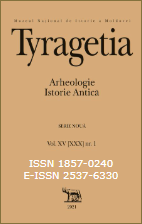Интерпретация сакральных символов и сюжетов на раннесредневековом поклонном камне близ села Pудь
Interpretation of sacral symbols and scenes depicted on the early medieval worship stone near the village of Rudi
Author(s): Igor BondarSubject(s): Cultural history, Social history, 6th to 12th Centuries, Sociology of Art, History of Religion, History of Art
Published by: Muzeul Naţional de Istorie a Moldovei
Keywords: the Dnister River basin; Early Middle Ages; Christianity; image of Jesus Christ; three sacred scenes; worship stone; old-type altar;
Summary/Abstract: The monument discovered near the village of Rudi in the Soroca District is a pyramidal worship stone with a pronounced anthropomorphic appearance of the front part. The stone appears to have been used for liturgical, calendar and ritual purposes. It has a clear astrological and archaeological significance and testifies to a strong influence of Christianity in the Early Middle Ages. In the worship stone there is an old-type altar, consisting of drainage systems: a cup-shaped cavity and a gutter, and two rectangular niches for icons. The sacred stone has various cosmogonic symbols, runes, Pattee crosses, anthropomorphic and ornithomorphic figures, a previously unknown type of bident, an image of Jesus Christ, and an image of a book with a cross. The main symbols are grouped into three sacred scenes. The object is unique in its kind and has traces of Old Russian, Byzantine and Viking influences; it has no direct analogues. The stone of worship was created by the local population of the LukaRaikovets (Alcedar-Echimăuţi) culture in the Early Middle Ages. The author’s scientific work is intended to shed light on the early history of the Prut-Dniester interfluve, the chronicle proto-state of Uliches and Tivertsi, as well as on the spread of Christianity before 988 AD.
Journal: Tyragetia (Serie Nouă)
- Issue Year: XV/2021
- Issue No: 1
- Page Range: 361-385
- Page Count: 25
- Language: Russian

